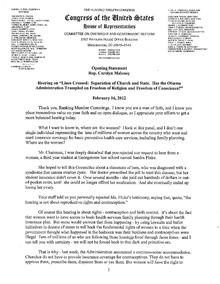Representative Carolyn Maloney opening statement at US Congress contraception hearing (2012 February 16)

Representative Carolyn Maloney opening statement at US Congress contraception hearing
HON. CAROLYN B. MALONEY
OF NEW YORK
IN THE HOUSE OF REPRESENTATIVES
February 16, 2012
Thank you, Ranking Member Cummings. I know you are a man of faith, and I know you place tremendous value on your faith and on open dialogue, so I appreciate your efforts to get a more balanced hearing today.
What I want to know is, where are the women? I look at this panel, and I don't see one single individual representing the tens of millions of women across the country who want and need insurance coverage for basic preventive health care services, including family planning.
Where are the women?
Mr. Chairman, I was deeply disturbed that you rejected our request to hear from a woman, a third year student at Georgetown law school named Sandra Fluke.
She hoped to tell this Committee about a classmate of hers, who was diagnosed with a syndrome that causes ovarian cysts. Her doctor prescribed the pill to treat this disease, but her student insurance didn't cover it. Over several months she paid out hundreds of dollars in out-of-pocket costs, until she could no longer afford her medication. And she eventually ended up losing her ovary.
Your staff told us you personally rejected Ms. Fluke's testimony, saying that, quote, "the hearing is not about reproductive rights and contraception."
Of course this hearing is about rights—contraception and birth control. It's about the fact that women want to have access to basic health services family planning through their health insurance plan. But some would prevent that from happening—by using lawsuits and ballot initiatives in dozens of states to roll back the fundamental rights of women to a time when the government thought what happened in the bedroom was their business and contraceptives were illegal. Tens of millions of us who are following these hearings lived through those times—and I can tell you with certainty—we will not be forced back to that dark and primitive era.
That is why - last week, the Administration announced a common-sense accommodation. Churches do not have to provide insurance coverage for contraceptives. They do not have to approve them, prescribe them, dispense them or use them. But women will have the right to access them - women who work at non-profit religious entities, like hospitals and universities, will be able to obtain coverage directly from their insurance companies—not from religious organizations—but from insurance companies.
Medical and health experts support this policy, economists support this, and a host of Catholic groups that were conspicuously not invited today support this. The vast majority of women—including women of faith—use some form of birth control at some point in their lives, whether to plan the number or spacing of their children, or to address significant medical conditions.
With all due respect to the Bishops, though you have every right to follow your conscience and honor all the dictates of your faith - no one should have the power to impose their faith on others—to bend them to your will—simply because they work for you. That in itself—is an assault on the fundamental freedoms enshrined in our Constitution.
Mr. Chairman, I urge you once again, let Ms. Fluke testify. Let one woman speak on this panel—right now. She is here in the audience today—just steps away. Even if you think you will disagree with everything she says, don't you owe it to the tens of millions of American women whose lives will be affected by what we do here today—to let just one—just one speak on their behalf?
Thank you.
____________________
![]()
This work is in the public domain in the United States because it is a work of the United States federal government (see 17 U.S.C. 105).
![]()
Public domainPublic domainfalsefalse
